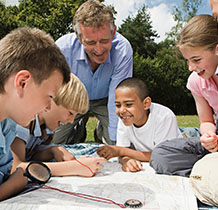Resource Database

Click on a topic or use the search box below to look for a listing:
There are 488 resources. Displaying 10 resources per page.
This research brief from ExpandedED Schools reports on the promising findings of their STEM Educators Academy, where classroom teachers and afterschool educators came together to learn at leading science institutions and then returned to their campuses to teach STEM-related projects that would spark interest and curiosity in math and science. The key findings offer both challenges and recommendations for those working to immerse youth in enriching STEM education. These include the need to provide additional support to help teachers and community educators incorporate opportunities for reflection and relevance in STEM learning and support in using planning time effectively.
View Resource
Academic Enrichment
PBS Education has developed an educational guide for the 2016 elections, with tools, resources, and creative strategies to help students understand the political process in this election year. This interactive tool can turn the news of the political race for president into learning opportunities.
View Resource
Academic Enrichment
The National Afterschool Association presents Talk Tuesday as a resource for afterschool professionals to host relevant discussions with colleagues, staff, and community partners around topics that are engaging and important to your program. This particular discussion guide provides a brief article along with the discussion questions around the topic of how libraries can partner with afterschool providers to support youth in your community.
View Resource
Afterschool Enrichment
In children we know it as SEL or social-emotional learning, and in adults we call it emotional intelligence. As community providers, understanding how to help youth develop their SEL skills can also help develop leadership and emotional intelligence skills later in life. This 13-minute video presentation was produced as part of Margo Herman's Leading with Emotional Intelligence Fellowship Project with the National AfterSchool Association to help afterschool practitioners better understand how Emotional Intelligence interfaces with SEL.
View Resource
Is your program staff intentionally trained to be culturally responsive? It can be difficult for staff to understand how to provide a safe environment for youth if they have no experience or awareness of the different cultures, races, or physical disabilities that may be represented in the program they serve. Several states, including Washington and Arizona, have made cultural responsiveness one of their out-of-school time program quality standards. Read more on the Youth Today website about why leaders from School's Out Washington, and other organizations, are talking about the necessity of culturally competent youth programming.
View Resource
Diverse Learners
 "A subscription or fee is required to access this resource.
If you would like to read the rsource you can purchase it from the publisher or
ask your local library if they subscribe to the publication or can order a copy."
"A subscription or fee is required to access this resource.
If you would like to read the rsource you can purchase it from the publisher or
ask your local library if they subscribe to the publication or can order a copy."
The American Youth Policy Forum describes here five important ways that foster youth can be supported, practices that were spotlighted in the June release of the U.S. Department of Education’s guidance on the Every Student Succeeds Act (ESSA). This article is a valuable tool to those working with youth within the school system or as outside community support. The collaboration that can be fostered by having a common language around these supports can be invaluable to our youth within the foster care and juvenile justice systems.
View Resource
Diverse Learners
This Fact Sheet presented by the National Child Traumatic Stress Network provides practical ways in which community support providers can help families in their own community during a major economic crisis. The step-by-step guide shows community organizations how to help create a sense of safety, calm the nerves of citizens who feel angry or hopeless, build up self-efficacy and community efficacy, promote connectedness, and foster hope. Providers can help to build up their struggling community so that everyone benefits.
View Resource
Diverse Learners
USAGov and Rocky Mountain MIRECC for Suicide Prevention teamed up to share some important tools to help guide those dealing with the challenging crisis of attempted suicide. Resources include links to the National Suicide Prevention Lifeline, guidance to assure caregivers take care of their own needs, advice on communicating with children during times of crisis, tools on resiliency and moving forward after a crisis.
View Resource
Diverse Learners
Research has proven that children are best supported when communities and schools work together for positive outcomes for youth. This includes conveying a unified message around healthy food and lifestyle choices. The Alliance for a Healthier Generation recently launched the Smart Food Planner, a tool that helps community organizations find ideas for healthy snacks, meals, and beverages for everything from events to everyday afterschool activities. The tool makes it easier for schools and community organizations to quickly find healthy options for a variety of events.
View Resource
Program Management
This study examines an initiative sponsored by the Wallace Foundation aimed at improving the financial management skills and practices of 25 Chicago afterschool providers through training and coaching. The effort provided and tested two models for professional development: intensive customized training and less costly group training and coaching. Both models produced long-lasting improvements. Moreover, organizations receiving the group training improved almost as much as those receiving customized training, albeit over the course of 3 years rather than 2.
View Resource
Program Management
There are 488 resources. Displaying 10 items per page.
- Academic Enrichment
- Afterschool Enrichment
- Classroom Management
- College and Career Readiness
- Diverse Learners
- Family and Community Engagement
- Program Management
- Social-Emotional Learning
- Sustainability
- Technology
Subscribe to the Illinois Quality Afterschool newsletter and resource bulletin.
